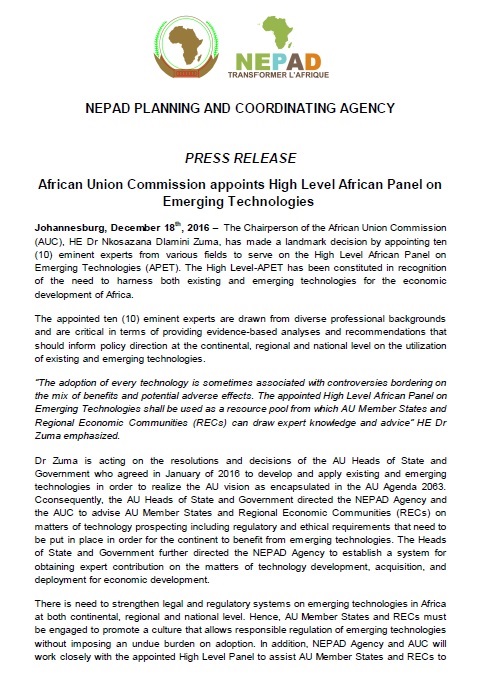Johannesburg, December 18th, 2016 – The Chairperson of the African Union Commission (AUC), HE Dr Nkosazana Dlamini Zuma, has made a landmark decision by appointing ten (10) eminent experts from various fields to serve on the High Level African Panel on Emerging Technologies (APET). The High Level-APET has been constituted in recognition of the need to harness both existing and emerging technologies for the economic development of Africa.
The appointed ten (10) eminent experts are drawn from diverse professional backgrounds and are critical in terms of providing evidence-based analyses and recommendations that should inform policy direction at the continental, regional and national level on the utilization of existing and emerging technologies.
“The adoption of every technology is sometimes associated with controversies bordering on the mix of benefits and potential adverse effects. The appointed High Level African Panel on Emerging Technologies shall be used as a resource pool from which AU Member States and Regional Economic Communities (RECs) can draw expert knowledge and advice” HE Dr Zuma emphasized.
Dr Zuma is acting on the resolutions and decisions of the AU Heads of State and Government who agreed in January of 2016 to develop and apply existing and emerging technologies in order to realize the AU vision as encapsulated in the AU Agenda 2063. Cconsequently, the AU Heads of State and Government directed the NEPAD Agency and the AUC to advise AU Member States and Regional Economic Communities (RECs) on matters of technology prospecting including regulatory and ethical requirements that need to be put in place in order for the continent to benefit from emerging technologies. The Heads of State and Government further directed the NEPAD Agency to establish a system for obtaining expert contribution on the matters of technology development, acquisition, and deployment for economic development.
There is need to strengthen legal and regulatory systems on emerging technologies in Africa at both continental, regional and national level. Hence, AU Member States and RECs must be engaged to promote a culture that allows responsible regulation of emerging technologies without imposing an undue burden on adoption. In addition, NEPAD Agency and AUC will work closely with the appointed High Level Panel to assist AU Member States and RECs to effectively assess the ethical and safety requirements and standards of emerging technologies by providing expert knowledge, advice and recommendations. Furthermore, NEPAD Agency and AUC shall strive to create an enabling environment were debates on the subject can flourish and divergent views on emerging technologies can be accommodated.
The decision of the AU Heads of State and Government follows the adoption of the Science, Technology and Innovation Strategy for Africa (STISA, 2024) in June 2014 as part of the AU Agenda 2063. The AU Agenda 2063 recognizes Science, Technology and Innovation (STI) as drivers for achieving Africa’s sustained growth, competitiveness and economic transformation.
The High Level-APET consists of 10 leading experts in various fields, representing both gender and geographical demographics and is co-chaired by Prof. Calestous Juma of Harvard University and Prof. Yaye Kène-Gassama Dia of University Cheikh Anta Diop, Dakar. Other members of the panel include: Prof. Roseanne Diab, Executive Officer of the Academy of Science of South Africa (ASSAf) and Emeritus Professor in the School of Environmental Sciences, University of KwaZulu-Natal; Professor Berhanu Abegaz, Executive Director of the African Academy of Sciences; Professor Francine Ntoumi, currently, Director of the Foundation Congolaise pour la Recherche Médicale and Senior Lecturer at University M. Ngouabi, Congo-Brazzaville; and Professor Abdallah Daar, Professor of Public Health Sciences at the Dalla Lama Faculty of Public Health, University of Toronto, with a cross-appointment in the department of Surgery.
The rest are Professor O. Ibidapo-Obe, a Distinguished Professor of Systems Engineering and former Vice Chancellor (2000-2007) at the University of Lagos, and is the current Vice-Chancellor of the Federal University Ndufu Alike Ikwo, Ebonyi State, Nigeria; Dr. Rachel Chikwamba, CSIR Group Executive: Strategic Alliances and Communication and manager of the CSIR’s high-level partnerships and stakeholder interactions and associated communication; Prof. Dr. Shireen Assem, Director of the Agricultural Genetic Engineering Research Institute (AGERI), Agricultural Research Center (ARC) of Egypt; and Prof. Karim Maredia, Professor and Director of the World Technology Access (WorldTAP) Program in the College of Agriculture and Natural Resources at Michigan State University, East Lansing, Michigan, USA.
Apart from offering advice to the AU and its Member States on harnessing emerging technologies for economic development, the High Level-APET shall also make recommendations on the nature of regional institutional arrangements that are required to promote and sustain common regulatory approaches to the application and use of, and propose a strategy and policy on emerging technologies in Africa.
End.
For more information and to arrange interviews contact:
Prof. Aggrey Ambali
NEPAD Agency – Head of Industrialization, Science, Technology and Innovation
Phone: +27 0112563600
Email: aggreya@nepad.org




